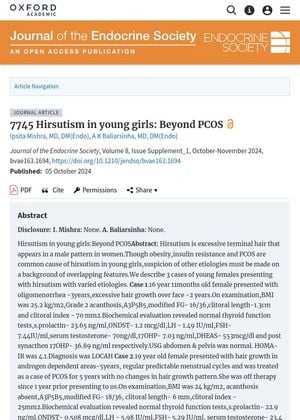TLDR Hirsutism in young girls can have various causes beyond PCOS, so diagnoses should be reconsidered if treatments don't work.
The article discusses hirsutism in young girls, highlighting that while obesity, insulin resistance, and PCOS are common causes, other etiologies should be considered. It presents three cases with different diagnoses: a 16-year-old with late-onset congenital adrenal hyperplasia (LOCAH), a 19-year-old with idiopathic hirsutism, and a 12-year-old with PCOS and ovarian thecosis. The study emphasizes the importance of revisiting diagnoses if initial treatments are ineffective, as hyperandrogenic disorders can present variably in young females.
 27 citations
,
January 2013 in “Indian Journal of Dermatology, Venereology and Leprology”
27 citations
,
January 2013 in “Indian Journal of Dermatology, Venereology and Leprology” PCOS is a complex disorder managed by treating symptoms and requires a team of specialists.
 21 citations
,
December 2007 in “Primary Care”
21 citations
,
December 2007 in “Primary Care” Early diagnosis and treatment of PCOS is crucial to reduce emotional distress and health risks.
 1 citations
,
June 2019 in “Innovare journal of medical sciences”
1 citations
,
June 2019 in “Innovare journal of medical sciences” Polycystic Ovary Syndrome (PCOS) is a hormonal disorder in women that can cause infertility and other health issues, and it may be improved by treatments that increase insulin sensitivity.
 989 citations
,
August 2007 in “The Lancet”
989 citations
,
August 2007 in “The Lancet” PCOS is a complex condition with major health impacts, needing more research for better diagnosis and treatment.
 97 citations
,
July 2006 in “Dermatologic therapy”
97 citations
,
July 2006 in “Dermatologic therapy” The document concludes that accurate diagnosis and personalized treatment are important for skin problems in women with PCOS.
 17 citations
,
May 2019 in “Diabetes and Metabolic Syndrome: Clinical Research and Reviews”
17 citations
,
May 2019 in “Diabetes and Metabolic Syndrome: Clinical Research and Reviews” High fasting insulin levels in women with PCOS are linked to a higher risk of heart and metabolic problems.






